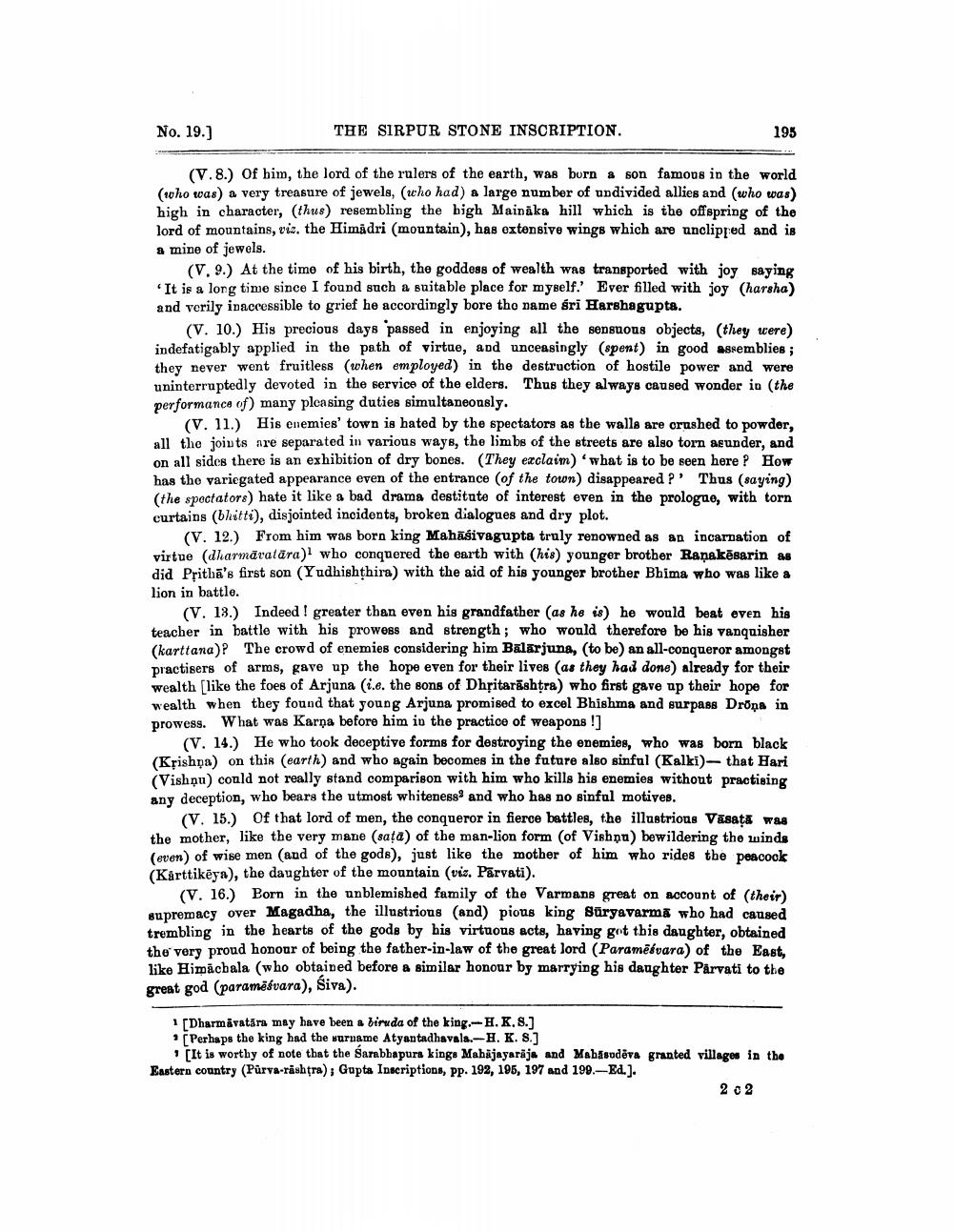________________
No. 19.)
THE SIRPUR STONE INSCRIPTION
195
(V.8.) Of him, the lord of the rulers of the earth, was burn a son famous in the world (who was a very treasure of jewels, (who had) a large number of undivided allies and (who was) high in character, (thus) resembling the high Mainaka hill which is the offspring of the lord of mountains, vis, the Himadri (mountain), has extensive wings which are unclipped and is a mine of jewels.
(V. 9.) At the time of his birth, the goddess of wealth was transported with joy saying It is a long time since I found such a suitable place for myself.' Ever filled with joy (harsha) and verily inaccessible to grief he accordingly bore the name sri Harshagupta.
(V. 10.) His precious days passed in enjoying all the sensuous objects, (they were) indefatigably applied in the path of virtue, and unceasingly spent) in good assemblies; they never went fruitless (when employed) in the destruction of hostile power and were uninterruptedly devoted in the service of the elders. Thus they always caused wonder in the performance of) many pleasing duties simultaneously.
(V. 11.) His enemies' town is hated by the spectators as the walls are crushed to powder, all the joints are separated in various ways, the limbs of the streets are also torn aeunder, and on all sides there is an exhibition of dry bones. (They exclaim) 'what is to be seen here? How has the variegated appearance even of the entrance of the town) disappeared ?' Thus (saying) (the spectators) hate it like a bad drama destitute of interest even in the prologue, with torn curtains (bhitti), disjointed incidents, broken dialogues and dry plot.
(V. 12.) From him was born king Mahāśivagupta truly renowned as an incarnation of virtue (dharmāvatāra)? who conquered the earth with (his) younger brother Raņakēsarin as did Pritha's first son (Yudhishthira) with the aid of his younger brother Bhima who was like a lion in battle.
(V. 13.) Indeed! greater than even his grandfather (as he is) he would beat even his teacher in battle with his prowess and strength; who would therefore be his vanquisher (karttana)? The crowd of enemies considering him Bālārjuna, (to be) an all-conqueror amongst practisers of arms, gave up the hope even for their lives (as they had done) already for their wealth (like the foes of Arjuna (i.e. the sons of Dhritarăshtra) who first gave up their hope for wealth when they found that young Arjuna promised to excel Bhishma and surpass Dröna in prowess. What was Karna before him in the practice of weapons !]
(V. 14.) He who took deceptive forms for destroying the enemies, who was born black (Krishna) on this earth) and who again becomes in the future also sinful (Kalki)- that Hari (Vishņu) could not really stand comparison with him who kills his enemies without practising any deception, who bears the utmost whiteness and who has no sinful motives.
(V. 15.) Of that lord of men, the conqueror in fierce battles, the illustrious Vasată was the mother, like the very mane (sața) of the man-lion form (of Vishạn) bewildering the winds (even) of wise men and of the gods), just like the mother of him who rides the peacock (Karttikėya), the daughter of the mountain (viz. Pārvati).
(V. 16.) Born in the unblemished family of the Varmans great on account of their) supremacy over Magadha, the illustrious (and) pious king Suryavarma who had caused trembling in the hearts of the gods by his virtuous acts, having got this daughter, obtained the very proud honour of being the father-in-law of the great lord (Paramētvara) of the East. like Himachala (who obtained before a similar honour by marrying his daughter Parvati to the great god paramēsvara), Siva).
1 [Dharmávatāra may have been a binda of the king.-H.K, S.]
Perhaps the king had the surname Atyantadhavala.-H. K. 8.]
It is worthy of note that the Sarabhapura kings Mahājayaraja and Mabisodöva granted villages in the Eastern country (Purva-rashtra); Gupta Inscriptions, pp. 192, 195, 197 and 199.-Ed.).
2 02




